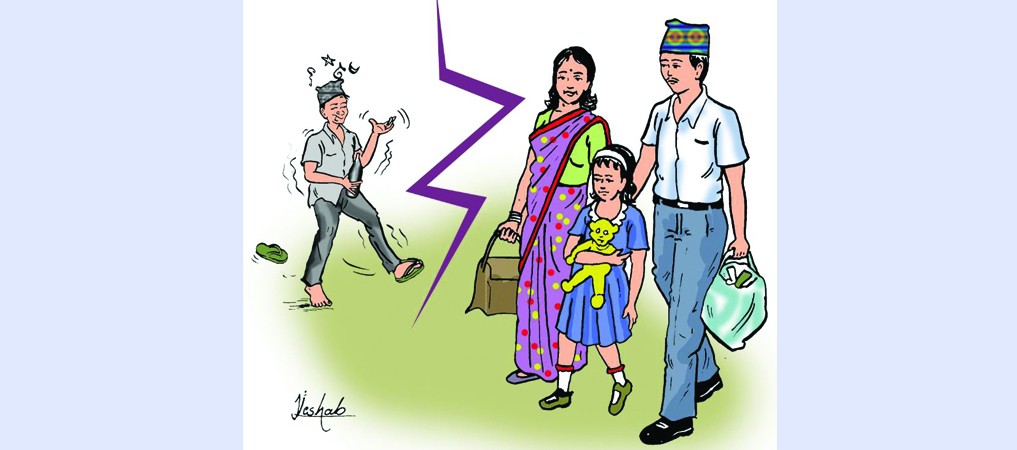NCP’s code of conduct: Imposition of social mores on cadres?

Ritu Raj Subedi
The 11-point code of conduct, issued by the ruling Nepal Communist Party (NCP), has drawn mixed responses from the members of public. The circular aims to check anomalies besetting the mammoth party organisation that has over 800,000 members following the unification of two former parties – CPN-UML and CPN-Maoist Centre. It wants to inject social, cultural and fiscal ethos into the life of the party members.
Collective lifestyle
The code of conduct is full of moral preaching that seeks to culturally purify the cadres and promote collective lifestyle. For example, the cadres should run businesses and industries under the collective leadership so as to discourage individualistic attitude. The party functionaries should participate in village picnic or any form of village feast at least once a month to develop the collective life system. Such an occasion must not feature liquor. In a similar manner, it obliges the party members to practice equality among the family members, respect women and fight untouchability and discrimination. To defer to labour and divide the daily works among the family members above 16 years of age is good idea. This enhances emotional bond in the family and establishes social solidarity.
The code of conduct urges the party members to report to the government about any corrupt practices, black marketing, illegal kickbacks and tax evasion. Undersigned by two chairs KP Sharma Oli and Pushpa Kamal Dahal Prachanda, the code of conduct apparently seeks to resolve political and organisational problems. The cadres are likely to face disciplinary action if they fail to abide by these instructions.
Nonetheless, one may question the party’s ability to push for collectivised economic undertaking given that the country has adopted and applied the neo-liberal economic policy. Freewheeling market is dominating the state-led economic initiative. The market economy is in place since early 1990s and no communist government dared to reverse the flawed economic policy blamed for the collapse of over 30 public enterprises in the past. Instead of pontificating about the puritanical ideology, the communist government should pull its weight to revive the industries that manufacture basic goods and provide services to the people. If so, the youth will get jobs at home and won’t be forced to sweat blood in alien lands to support their families back home.
In order to bolster the state’s coffers, the communist government has called for their functionaries to pay tax to the government. It is the duty of all citizens to pay taxes to the state but a responsible government has also duty towards its citizens. Is the taxpayers’ money has been properly spent on meeting the basic needs of the people? Why is the poorer section of the people unable to afford for expensive education and health services which are mostly run by the private sector? Likewise, the NCP has asked the workers to inform the party about the corrupt activities of those holding the public office. This instruction is for enhancing the good governance and corruption-free society. But the government must get tough with the corrupt officials. Many corruption scams have rocked the nation. And the powerful government must demonstrate the guts and sincerity to crack down on the corrupt person.
Seen from the broader perspective, the ruling party’s approach to discipline the cadres is not otherwise. It is intended to maintain order and unity within the party. But what about the leaders who have metamorphosed themselves into elite class from their ordinary economic status and humble background? It is an open secret that many communist leaders have become nouveau riche over the year, eroding the core proletarian values and ideals. Many leaders have started to pooh-pooh the Spartan lifestyle that is widely followed by the rank and file. Until and unless the NCP adopts the stringent measures to fight against the elements of elitism, gerontocracy, nepotism, factionalism and sycophancy that are thriving inside the party, it makes no sense to demand high moral conduct from the cadres.
‘Ta’ is not entirely derogatory term
The circular contains another ludicrous point- it has prohibited the party cadres and leaders from calling anybody, including their own sons and daughters with the word ‘Ta’ in Nepali. ‘Ta’ is, of course, very informal way of addressing the people, and sometime the people get angry if they are called ‘Ta.’ But one anthropologist said that the word ‘Ta’ is a form of endearment used among the family members and bosom friends. It creates damaging impact if someone calls ‘Ta’ to unfamiliar guys or those who are senior and respectable people. Otherwise, word ‘Ta’ does not harm the relations between the people. Rather it animates friendship between the addressee and the addressed. The party had better concentrate on the real issues that hampers in attaining peace and harmony in the society. It must not spend time and energy on petty things to gain cheap popularity.
Recent News

Do not make expressions casting dout on election: EC
14 Apr, 2022
CM Bhatta says may New Year 2079 BS inspire positive thinking
14 Apr, 2022
Three new cases, 44 recoveries in 24 hours
14 Apr, 2022
689 climbers of 84 teams so far acquire permits for climbing various peaks this spring season
14 Apr, 2022
How the rising cost of living crisis is impacting Nepal
14 Apr, 2022
US military confirms an interstellar meteor collided with Earth
14 Apr, 2022
Valneva Covid vaccine approved for use in UK
14 Apr, 2022
Chair Prachanda highlights need of unity among Maoist, Communist forces
14 Apr, 2022
Ranbir Kapoor and Alia Bhatt: Bollywood toasts star couple on wedding
14 Apr, 2022
President Bhandari confers decorations (Photo Feature)
14 Apr, 2022











